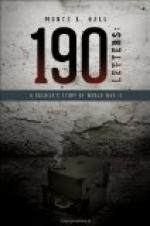’Et le monde allait
donc mourir
Avec mes yeux, miroir du monde.’
Solemn thought for the man who has watched through a long night in some advance-post, and who, beyond the grey and silent plain where lurks the enemy, sees a red sun rise yet once more upon the world! ’O splendid sun, I wish I could see you again!’ wrote once, on the evening of his advance upon French ground, a young Silesian soldier who fell upon the battlefield of the Marne, and whose Journal has been published. Suddenly breaks in this mysterious cry in the course of methodical German notes on food and drink, stages of the march, blistered feet, the number of villages set on fire. And in how many French letters too have we found it—that abrupt intuition! It is always the same, in many and various words: in those of the agriculturist of the Seine-et-Marne, whom I could name, and who for perhaps the first time in his life takes an interest in the sunset; in those of the young middle-class Parisian who had seemed incapable of speech save in terms of unbelief and burlesque; in those of the artist who utters his emotion in poetry and lifts it up to the heights of stoical philosophy. Through all unlikenesses, in the hearts of all—peasant, citizen, soldier, German schoolmaster—one prevailing thought is revealed; the living man, passing away, feels, at the approach of eternal night, an exaltation of his sense of the splendour of the world. O miracle of things! O divine peace of this plain, of these trees, of these hillsides! And how keenly does the ear listen for this infinite silence! Or we hear of the immensities of night where nothing remains except light and flame: far off, the smouldering of fires; far up, the sparkle of stars, the shapes of constellations, the august order of the universe. Very soon the rattle of machine-guns, the thunder of explosives, the clamour of attack will begin anew; there will again be killing and dying. What a contrast of human fury and eternal serenity! More or less vaguely, and for a brief moment, there comes into passing life a glimpse of the profound relation of the simple things of heaven and earth with the mind of him who contemplates them. Does man then guess that all these things are indeed himself, that his little life and the life of the tree yonder, thrilling in the shiver of dawn, and beckoning to him, are bound together in the flood of universal life?
* * * * *
For the artist of whom we are now reading, such intuitions and such visions were the delight of long months in the trenches. Under the free sky, in contact with the earth, in face of the peril and the sight of death, life seemed to him to take a sudden and strange expansion. ’From our life in the open air we have gained a freedom of conception, an amplitude of thought, which will for ever make cities horrible to those who survive the war.’ Death itself had become a more beautiful and a more simple thing; the death of soldiers on whose dumb shapes




